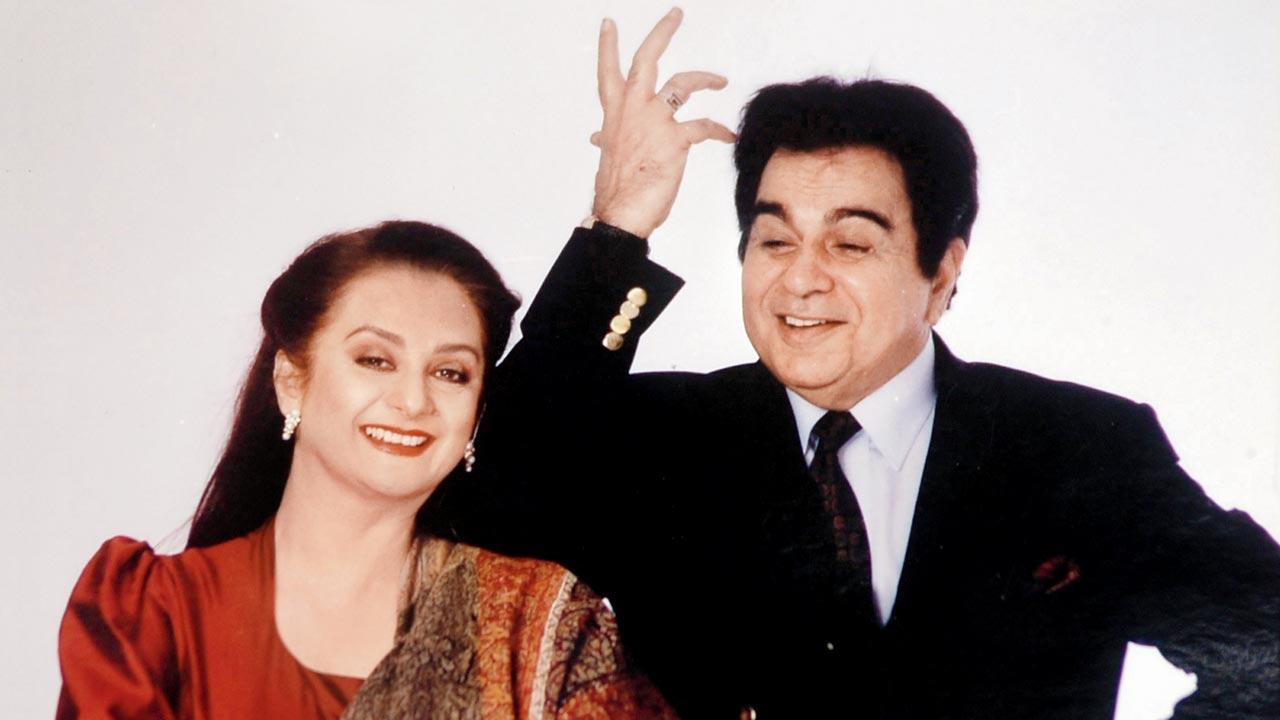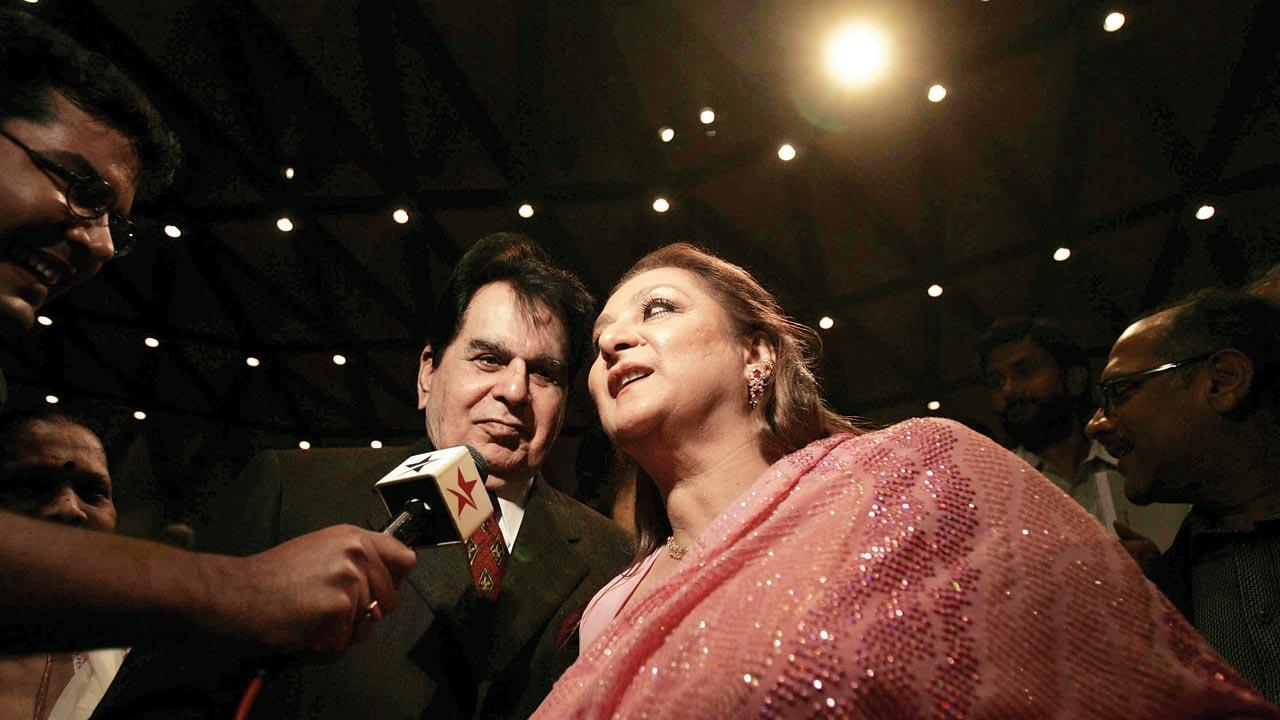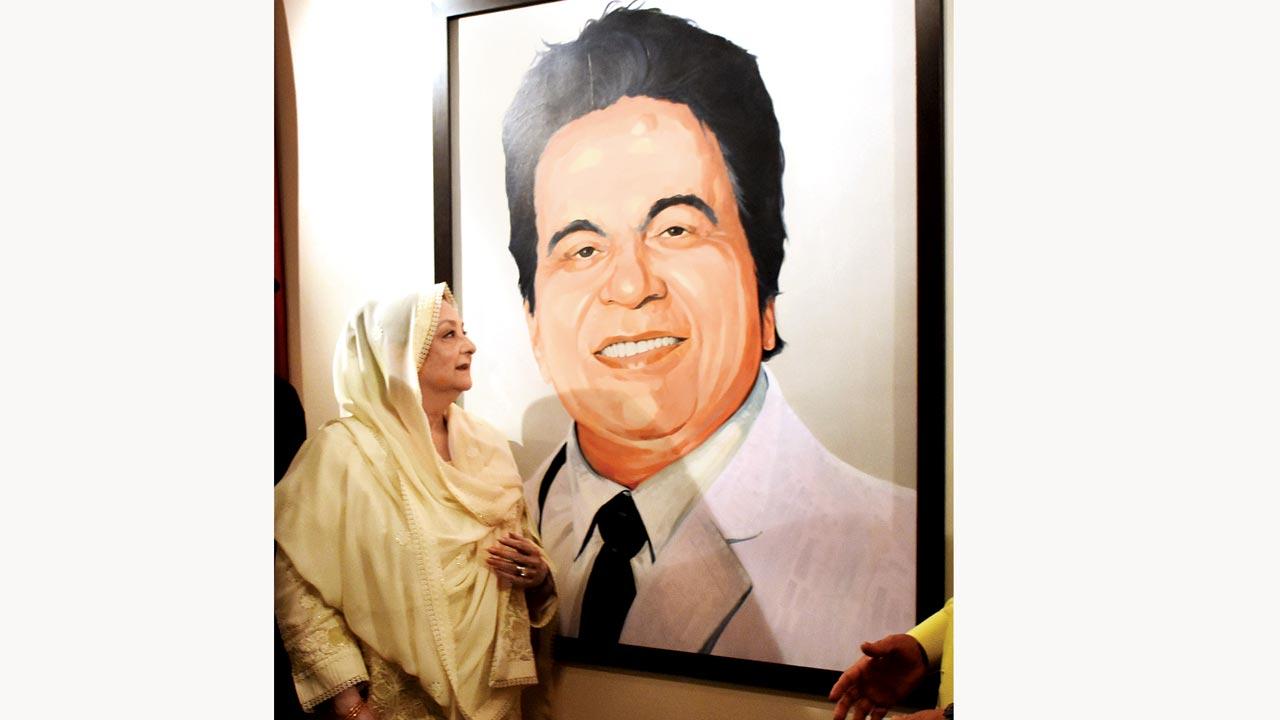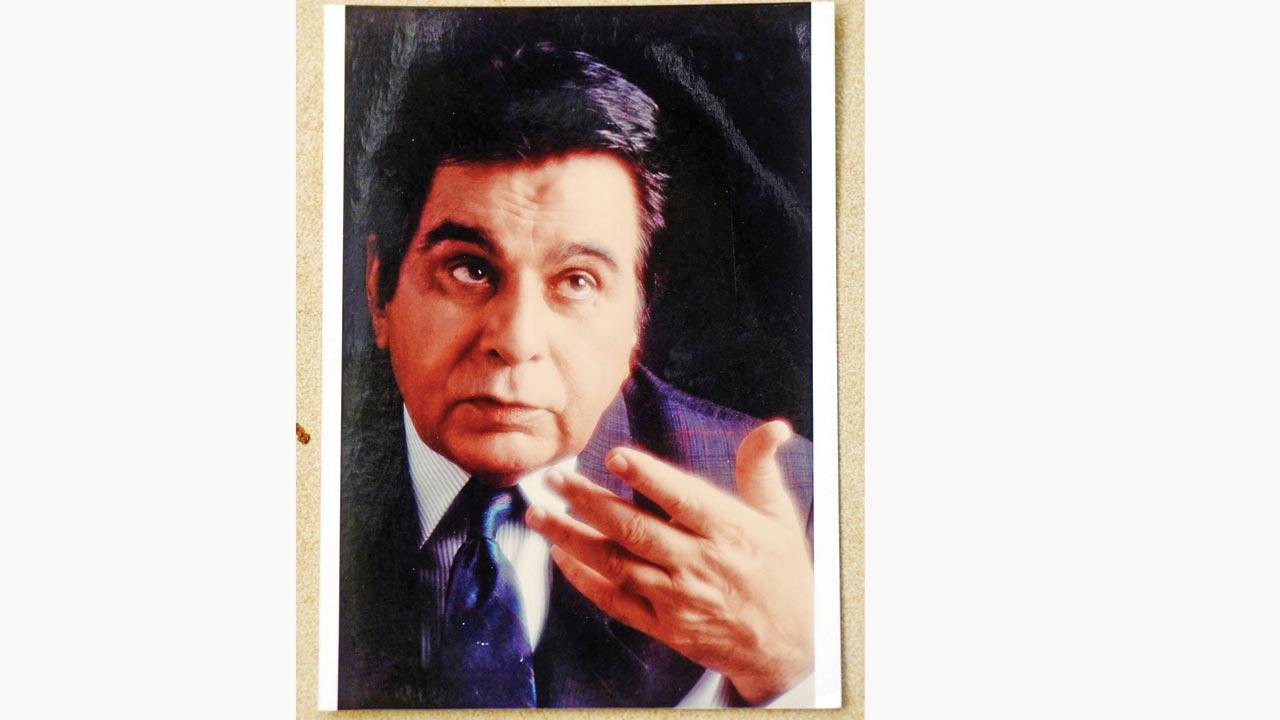On his birth centenary, as Film Heritage Foundation gears up to celebrate legend Dilip Kumar’s iconic films on the big screen, wife Saira Banu talks ishq and yaadein in nostalgic hour with mid-day

Saira Banu with husband late Dilip Kumar
She was the “chand ka tukda” next door, ever-so-ravishing, and loved her figure-hugging salwar suits, beehive bun with a slight fringe and the acting calibre of a veteran. He was the sombre legend, who was two decades her senior. But, no one batted an eyelid when super stars Saira Banu and “saab” Dilip Kumar said they were made for each other.
A year-and-a-half after he passed away following a prolonged struggle with prostate cancer, the Film Heritage Foundation (FHF) is celebrating 100 years of Dilip Kumar on his birth anniversary, today.
“It was a marriage of 56 years,” she tells us over the phone, apologising for not being able to meet in person. Banu, 78, is nursing a cold and busy with the centenary preparations, but there is an eagerness in her voice to talk about her eternal love. “There was a great understanding between us, as husband and wife. Relationship is liye chali ke shuru se hee duniya jaanti hai, I was madly in love with him. And he gave me so much love in return.”
 Saira Banu and Dilip Kumar at a function in Mumbai, 2005. Pics/Getty Images
Saira Banu and Dilip Kumar at a function in Mumbai, 2005. Pics/Getty Images
She is able to paint a vivid picture of her first sighting Kumar when she was 12. “I was schooling in London,” she says in between sips of water, “and my mother, Naseem Banu, was invited as guest of honour to the La Scala theatre in London for the premiere of saab’s film Aan. I was in pigtails, but the moment I saw him, I plummeted into love.” The Mehboob Productions 1952 film, says Banu, was the first Dilip Kumar film she watched. “My mother knew that if I ever were to marry, it would only be him. So, in some way, our relationship goes back 66 years.”
Kumar, though, considered her a “bachchi”. “We were family friends, so he’d visit our home and treat me like a child. In fact, even after I tasted stardom with my debut film Junglee in 1961, he refused to act with me in several films.”
Had it not been for Kumar’s refusal to work with Banu, she would have been one of the female leads in Vijaya Productions, Ram Aur Shyam, in place of Mumtaz or Waheeda Rahman. “I was informed that saab had refused to work with me saying I would look very young opposite him on screen.”
 Saira Banu during the unveiling of Dilip Kumar’s mural on his 99th birthday in 2021, a few months after the actor’s death
Saira Banu during the unveiling of Dilip Kumar’s mural on his 99th birthday in 2021, a few months after the actor’s death
Five years later, in October 1966, they were married. She was 22 and he, 44. It is said Banu’s mother played cupid. “Dhoom machh gayi thi!” she recalls of the time their engagement news leaked in the press. “People had never seen us together on screen and now, we were to get married. It was something out of the ordinary.”
An outdoor shoot in Kolkata had to be wrapped up and reshot at an indoor studio in Mumbai because it was getting impossible to shoot among fans. “Just before we were to marry,” she remembers, “we happened to be in Kolkata. I had to do an outdoor shoot, and saab was finishing some script work. When we landed, there was a huge crowd of fans waiting at the airport. At that time, we weren’t surrounded by security, and fans had gathered on the tarmac. Some had found their way inside the airplane too! It became impossible for the shoot to continue, so we had to pack up and return to Bombay.”
It’s what led the couple to get married in a hurry minus preparations, wedding cards or wedding dress. “He said, let’s just go to Bombay and exchange wedding bands in a simple ceremony. It was all done in five days.” Banu, who was a glamorous dresser, missed having an elaborate wedding dress. Her mother had to get the tailor to stitch a brocade gharara in haste. “Saab got himself a Jodhpuri suit,” she adds. “It was unplanned and unusual, and still we had thousands barge into the garden venue.”
 A photo of Dilip Kumar from Saira Banu’s photo collection at their Pali Hill bungalow
A photo of Dilip Kumar from Saira Banu’s photo collection at their Pali Hill bungalow
Interestingly, Banu herself decided she would no longer act; Kumar didn’t stop her. He had not watched any of her films. “He saw some rushes of Shagird (1967) and told me that it would be unfortunate if he stopped me from working. He said the love I had for my art, and how good I was at it, was visible on celluloid. He could not take that away from me.”
The 1968 hit film Padosan, produced by comedian Mehmood, and Purab Aur Paschim (1970) by actor, director and writer Manoj Kumar, were written with Banu in mind. “Both of them came to saab and asked for ijazat to cast me as lead. If they couldn’t, they’d shelve the films.”
The love and respect is palpable in the melancholia Banu enveloped herself in after his death. Within a month, she fell violently ill. “I could barely breathe,” she remembers of the time she was rushed to intensive care. “I have not stepped out of the house since, barring visits to the hospital and doctor.”
This is atypical for someone who was out and about, and loved to go on long drives with Kumar. “My family and staff sometimes insist that I step out. Sitting in his car for the first time after his death was traumatic. Bahot dil kharab hua tha, bahot rona aaya tha. Sometimes, I do take a short drive along Carter Road in his car and reminisce about the times he’d be by my side.”
FHF is preparing to screen four of Kumar’s iconic films, Ram Aur Shyam, Aan, Devdas and Shakti, for the Hero of Heroes celebrations scheduled for this weekend, across PVR cinemas in 20 cities. Banu is going to make an exception, and step out of their Pali Hill home. “If I can, I will stay back to watch Aan, but I know it will be hard. Even today when I see him on television, mujhse bardasht nahin hota.”
This celebration is special for more reasons than one. That it’s an effort to restore classics of Indian cinema makes it an important one for Banu. “It’s a pity that studios are being brought down and the classics are biting dust. We can only watch the old films on television. FHF should be applauded for bringing some of these back to the big screen.”
Had Kumar been alive, the house, like with every birthday, would have been flooded with flowers, says Banu. They’d receive so many blooms from well wishers, friends and fans that they’d distribute them across various hospitals. “He was not the ordinary celebrity,” Banu says, adding, “He was a humanitarian. From when he was as young as 25, he started working for the blind and physically disabled. Together with industry veterans, he’d drum up support from the industry to help those affected by famine and flood. We’d ride on trucks to collect money and clothes for the poor.”
 Subscribe today by clicking the link and stay updated with the latest news!" Click here!
Subscribe today by clicking the link and stay updated with the latest news!" Click here!










